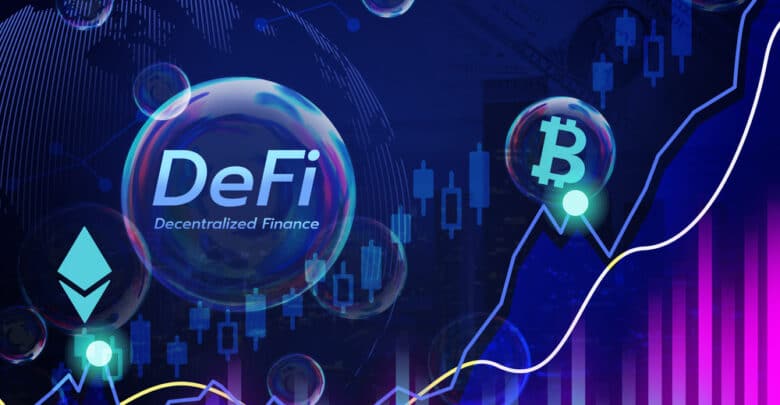
Decentralized finance, or DeFi, is a promising new way to do financial transactions that uses blockchain technology. It is a promising alternative that has already begun to disrupt the industry and could one day replace regular finance, which is currently fraught with problems.
DeFi products and services allow users to conduct transactions and exchange assets using a decentralized blockchain network. These products and services are often used to make it easier and faster to move money around the world and to protect users’ privacy and security.
DeFi applications are designed to break away from the regular financial system, which has been championed by banks. These applications rely on blockchains to eliminate the need for middlemen, which can provide significant benefits for both users and the economy as a whole. They provide a more direct and efficient way for people to trade goods and services, removing the need for a third party.
Decentralized finance is a way to generate passive income by investing in decentralized assets. This can be done by investing in cryptocurrencies and other DeFi tokens or by using DeFi platforms to automatically manage your investments. These assets are not subject to the whims of a single institution or individual, and as a result, they tend to be more stable and profitable than traditional investments.
As decentralized finance continues to gain traction, there are many potential uses for decentralized finance, opening up new opportunities for investors in DeFi to generate revenues passively. This includes opportunities for investing in projects that offer passive income streams, such as tokenized derivatives or other financial products, managing assets, and paying for goods and services.
To passively generate income, investors are required to dedicate their assets to confirming transactions and executing processes through the consensus mechanism of proof-of-stake. Therefore, Decentralized finance is a financial system where the management and control of money and assets are decentralized or spread out among a network of different entities.
This system is different from traditional banking systems, which are centralized and rely on a few large banks to control the flow of money. Decentralized finance could be used to reduce the risk of financial institutions and to increase the flow of money into disadvantaged areas. Passive income strategies that are based on DeFi are a new and growing trend in the world of online income.
These incomes are typically generated through a passive investment strategy, such as cryptocurrency trading, and then passively collect dividends or interest payments from the underlying assets. This type of income is attractive because it is passive, requires little to no effort on the part of the individual, and can be generated from a variety of sources, such as stocks, bonds, and cryptocurrencies.
There are a number of different options for generating passive income through DeFi technology. Some of these include investing in DeFi tokens, acquiring DeFi-based services, and holding DeFi-based assets. Let us explore all the options one by one.
Liquidity mining or DeFi yield farming
The term “yield farming” or “liquidity mining” refers to the practice of generating more digital currencies by utilizing crypto assets that are already existing. This is similar to the practice of cryptocurrency liquidity mining, which is when miners use their computers to help verify and add new transactions to a blockchain.
This is done by investing in cryptocurrencies that have high yields (i.e., those that offer high returns for holding them rather than trading them) and then selling these cryptocurrencies when they experience increases in value.
Yield farming is a strategy for investments that involves staking or delegating cryptocurrency assets in a liquidity pool based on a smart contract in order to receive a predictable return on investment. The blockchain is a distributed database that allows for smart contracts to be executed. Smart contracts are computer codes that can be automatically executed when certain conditions are met.
They are often used in business transactions, such as the sale of a product or the transfer of money. Blockchain technology is still relatively new, but it has the potential to revolutionize the way we do business. A blockchain-based smart contract system uses a distributed database to securely store and manage the terms of a contract.
The blockchain system allows for peer-to-peer transactions without the need for a third party. The technology behind the blockchain system makes it difficult to tamper with the contract terms and makes it difficult for parties to foul play.
This strategy is intended to provide investors with the opportunity to receive stable returns while minimizing risks. This approach is most common among those who believe that the market is too volatile to risk traditional investments in digital assets.
The pool allows users to use cryptocurrencies that have been invested in it to offer liquidity in DeFi platforms and disperses a part of the fees it charges as rewards to users. DeFi yield farms are committed to supporting the utilization of ERC-20 tokens like ETH for rewards and investments. This allows investors to get the most out of their tokens while also supporting the growth of the DeFi ecosystem.
Yield farming is a type of investment where farmers are programmed to aim for the highest possible return, which can be risky. This type of investment is often seen as one of the more risky options in the space of passive income. This is because yield farming can be subject to fluctuations in the market, which can affect investments.
Liquidity pools help to speed up the trading of cryptocurrencies on decentralized exchanges, providing a reward for the completion of tasks such as confirmation of transactions. This provides a way for decentralized exchanges to generate revenue while also keeping trading safe and reliable.
Each pool’s success will be based on the approaches put into place on the smart contracts. The payout for tokens held in the liquidity pool will be based on how much money (in the form of tokens) the user invested in the pool of liquidity. The farmer or operator of the liquidity pool tries to distribute the assets to users in the most profitable way possible by aiming to earn an annual percentage yield of as much as possible.
The APY is a unit of measure that shows the annual returns that are earned on an investment, that includes the compounding interest. This means that, over the course of a year, the APY will be higher if the investments return more money over time than if they return less money. The rate of average savings at traditional banks is around 0.06%, but that rate can be much higher for products like DeFi.
DeFi staking
The DeFi staking model is similar to yield farming, which incentivizes users to hold onto their cryptocurrencies over the long haul in order to earn rewards. Users are required to designate themselves as validators in order to use the blockchain. This process involves locking up some of their crypto assets in order to prove their commitment to the network.
DeFi (decentralized finance) staking is a means of securing returns through the security of tokens held by a DeFi platform. This is in contrast to centralized finance, where a single entity holds the majority of the assets. DeFi staking allows for more democratization of the financial system, as well as increased liquidity and security for participants.
DeFi staking is a way to generate rewards while supporting the DeFi ecosystem. By placing a stake in a DeFi project, you are helping to grow the network and earn rewards in the form of tokens or other benefits.
Staking involves locking up your digital tokens or assets for a set period of time in order to generate rewards. Different operators offer different rewards plans, so it’s important to choose the one that is best suited to your needs. This can be useful for investors who want to be sure their tokens are safe and will be worth something in the future.
This allows them to receive benefits, such as discounts or increased liquidity while helping to secure the network. Each blockchain requires a certain amount of tokens in order to allow users to become validators. For the blockchain of Ethereum, this minimum amount is 32 ETH.
There are two factors that will affect how much you earn through DeFi staking: the rewards plan offered by the network and how long you stake your tokens. DeFi staking can be a great way to benefit both financially and functionally from blockchain projects. It helps secure the project and improve performance.
DeFi lending
Cryptocurrencies offer numerous investment opportunities that can provide passive income. Lending is one such strategy, and it’s a great way to get started in the crypto world, as it offers a passive income stream. These strategies can involve lending money to other people, providing cryptocurrency derivatives and other financial products, or simply holding cryptocurrencies.
Investors can get involved in DeFi or decentralized lending via smart contracts that are already programmed, which allows for more direct interaction with borrowers. This allows for a more direct and efficient lending process, which is especially beneficial in cases of urgent need.
Lending platforms that use DeFi technology let investors enlist the digital tokens they hold to act as loans to borrowers. The loans can have a specified duration, and the platforms charge interest on the loans.
Smart contracts offer a number of benefits over traditional lending, including the removal of risk and the requirement for collateral. This makes them a more attractive option for businesses and individuals looking to secure financing. Many lending platforms don’t need individual verifications that are fundamental to limit credit and risks associated with the fraud.
This is because some lenders believe that these checks are not necessary or that they are not cost-effective. This is a risk for borrowers, as it can lead to stolen or fraudulent identities and could also lead to costly mistakes. This makes it easier for people who may not be able to provide reliable information about their personal finances to get a loan.
DeFi lending is a P2P service that lets people borrow cryptocurrencies from different investors in return for regular payments of interest. This is a helpful service for those who need to borrow cryptocurrency quickly but don’t want to deal with the hassle of traditional lending institutions.
It is a convenient way for crypto holders to get access to the funds they need quickly, and it helps to foster a community of crypto investors who are committed to providing quality loans.
With smart contracts, users from all over the world can pool their resources and disseminate cryptocurrency assets without the requirement for a third party. This is a huge advantage because it eliminates the need for trust, which can be a major issue when it comes to investing in cryptocurrencies.
The underlying technology of blockchain on which the smart contracts are based makes sure that transactions are immutable and transparent for all interested parties, ensuring that everyone involved has an accurate record of what has happened.
Risks associated with passive income strategies based on DeFi
Every investment carries risks, but there’s often a big payoff if you’re patient and wise. There is no one “right” investment, as each comes with its own set of rewards and risks. Some investments are riskier than others, but they can also offer bigger rewards. So be prepared for both good and bad times, and don’t be afraid to take risks if you think there’s a good chance of making a lot of money.
There are many risks associated with relying on earning passive income through DeFi. For instance, there’s the risk that the token or asset price will decline or the possibility of a market crash, making it difficult to generate income. Similarly, if the DeFi platform is hacked, users’ funds may be stolen.
Such passive income is not guaranteed, so investors may lose money if the platform fails to live up to expectations, and there will be an inability to generate revenue. Earning schemes associated with DeFi are risky because there’s a risk of scams, hacks, or faulty contracts.
This is why we recommend investing in DeFi-based tokens only if you are confident that the platform is secure and the tokens are backed by real value. Cryptocurrencies are volatile, which means that their prices can go up or down a lot. This can mean that if you hold onto your cryptocurrencies in the event of a bear market, you might lose money.
The earnings based on DeFi rely on the number of tokens that are earned, so if the value of those tokens falls, then the earnings can also fall. When the market is down, investors try to hold onto their tokens in order to make more money when the market picks up.
This is because during a bear market, tokens may be worth less than their original cost, but they may still be worth more than the market price if the market prices continue to increase. There is another risk involved with DeFi investment strategies, depending on the intentions of the pool owners. This risk can be especially high if the pool is used for illegal activities.
Therefore, it is essential to verify how credible the service providers are based on their past performance when making a decision about which ones to use. This way, you can be sure that the money you’re spending is going to be worth it.
Portfolio tracking
With DeFi, there are numerous ways to generate an income passively, so it can be difficult to keep track of all of them. A growing number of DeFi traders are using portfolio aggregators or trackers to interface to various wallets or protocols, so they can evaluate and deal with their entire portfolio from one dashboard.
The yield aggregator strives to be as efficient as possible in order to maximize profits. This means optimizing the techniques used to obtain the best yields possible. The decentralized services market is a large and diverse market with a variety of business models. There are numerous vaults and farms that get profits from this market.
Some aggregators offer integrations that allow you to access various charts that analyze data from different aggregators. Cross-chain technology allows different blockchains to share value and information. This makes the networks more interconnected, which can improve the efficiency and reliability of transactions on each individual blockchain.
This makes it possible to carry out complex transactions and create new applications that would not be possible on a single blockchain network alone. However, it is important to be mindful of scams that try to take away your tokens by pretending to be representatives of projects that will exchange your tokens for other assets. These projects are likely just hoping to drain your funds.
Conclusion
Decentralized finance is a new way of managing financial resources that are built on the principle of trustless and decentralized networks. These networks allow for more efficient and transparent transactions, which in turn can improve the overall economy.
Tokenhell produces content exposure for over 5,000 crypto companies and you can be one of them too! Contact at info@tokenhell.com if you have any questions. Cryptocurrencies are highly volatile, conduct your own research before making any investment decisions. Some of the posts on this website are guest posts or paid posts that are not written by Tokenhell authors (namely Crypto Cable , Sponsored Articles and Press Release content) and the views expressed in these types of posts do not reflect the views of this website. Tokenhell is not responsible for the content, accuracy, quality, advertising, products or any other content or banners (ad space) posted on the site. Read full terms and conditions / disclaimer.







